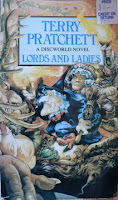 Barbara Ehrenreich is such a great journalist, I'd read her on anything, even if I wasn't particularly interested in the subject. But in Nickel and Dimed - On (Not) Getting By in America - her subject is the struggle on the fringes of affluent Western culture, and those who struggle it. Having struggled on a few fringes myself (oh to be an Artist in this benighted place) I was moved by those among whom Ehrenreich lived & worked while researching this book. Acknowledging her priveleged middle class background, and knowing she couldn't really 'experience' poverty, nonetheless she steps away from her safety nets & tries to make do on her minimum wage jobs - finding accommodation, health care, food, petrol. Finding support and unexpected kindness. But also finding deeply ingrained desperation, no hope that anything will improve, and an unfightable undertow in the struggle of the working poor.
Barbara Ehrenreich is such a great journalist, I'd read her on anything, even if I wasn't particularly interested in the subject. But in Nickel and Dimed - On (Not) Getting By in America - her subject is the struggle on the fringes of affluent Western culture, and those who struggle it. Having struggled on a few fringes myself (oh to be an Artist in this benighted place) I was moved by those among whom Ehrenreich lived & worked while researching this book. Acknowledging her priveleged middle class background, and knowing she couldn't really 'experience' poverty, nonetheless she steps away from her safety nets & tries to make do on her minimum wage jobs - finding accommodation, health care, food, petrol. Finding support and unexpected kindness. But also finding deeply ingrained desperation, no hope that anything will improve, and an unfightable undertow in the struggle of the working poor.Many of my fellow Australians would recognise this clawed existence (although we do have universal free health care here). I earlier spoke of my "struggle". But I come from the robust lower middle class, had good health care as a child, which set me up physically, lived in a house with two parents until I was 17, speak this language English well, and have always been encouraged to strive for goals beyond the daily need for food and shelter. Reading of the people in Ehrenreich's stories gave me pause, and made me angry. And made me vow never to again to say "Oh I'm so broke".




































